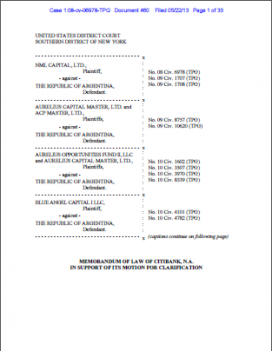Hat-tip to Bloomberg — it looks like we have a new entrant in the pari passu saga.
Citibank.
Technically it’s Citibank’s Argentine branch. They’ve made a slightly curious requestfor ‘clarification’ of Judge Griesa’s order last November for Argentina to pay bond holdouts alongside other, restructured creditors. (Payments just to the latter could be seized, and ultimately launch Argentina into a sovereign default… just to catch you up.)
Curious, because Citi seems to think any seizure could jump a certain — critical — bond-market species barrier.
So far in the saga, those ‘other, restructured creditors’ have mostly been holders of bonds which came out of Argentina’s debt swaps as governed under New York law. They also get paid out (in US dollars) using a New York-law trustee. A fight’s also brewing over whether Argentina’s payments on English-law versions of the debt, owned by the so-called Euro Bondholders, could be seized. Still, these are international creditors of Argentina.
The Republic can’t easily borrow fresh international debt these days anyway, precisely because the holdouts are ready to litigate. But the local-law market for Argentine debt is… thriving’s maybe not quite the word, but it’s there.
And it’s what Citibank has a finger in, through custody accounts at the Argentine branch — Argentine-law, US dollar and Argentine peso-denominated bonds which came out of the restructuring. Apparently the way Citi tells it, there’s no part of the payment system for these bonds that lives in New York either.
Why then is Citibank so keen to point out the following to Judge Thomas Griesa?:
No participant in the litigation leading to the issuance of the November 21 Orders addressed the Argentine Law Bonds, and there is nothing in the Court’s opinion or the terms of the November 21 Orders to suggest that the Argentine Law Bonds were within the contemplation of the parties or the Court…Indeed, while the unprecedented interpretation given by this Court and the Second Circuit to the pari passu provision in the defaulted bonds has been a matter of dispute, there is no dispute that the second clause of the provision excludes on its face the Peso-denominated Argentine Law Bonds from its reach: “The payment obligation of the Republic under the Securities shall at all times rank at least equally with all its other present and future unsecured and unsubordinated External Indebtedness.” The Peso-denominated Bonds do not constitute “External Indebtedness” within the meaning of this clause…As a general principle, the Argentine legal system does not recognize as enforceable the acts of foreign courts… Therefore, were Citibank Argentina to act in violation of Argentine law, the November 21 Orders would provide no shield.
Because it’s been here before between Argentina and its holdouts.
As Citibank also reminds Judge Griesa, he threw out an attempt by EM Ltd to seize funds handled by the bank paying Argentina’s Boden 2012 debt, a US dollar local-law bond which it originally issued to depositors hit by the corralito. Argentina “lost control” of the payments it made on the Boden somewhere in Argentina and they were no longer its assets thereafter, so the holdouts couldn’t seize them, Griesa said.
That Citibank is trying to make these points clear all over again about the pari passu ‘remedy’ shows how powerful (feared?) the clause has become.
It also suggests the order could be read as applying to local-law bonds somehow — because why else would Citibank bother the court for clarification.
Also, let’s assume Griesa will pay attention to Citibank, agree with them and rule out payment systems for local-law debt from the scope of this order. You’re Argentina. You possibly plan to nullify the order’s effect anyway — a favourite theme of the holdouts, this, though there’s no hard evidence a plan is motion here — precisely by offering foreign-law restructured holders their choice of equivalent local-law securities, to be paid nowhere near New York.
We still think it would be highly quixotic; it’s been made supremely difficult toorganise any swap under the terms of the order. A key part of it has not been stayed when it comes to banning both the Argentine government from making this kind of plan, and any lawyers or other agents that could aid and abet it. Still, what effect — if any — would a clarification in Citibank’s favour have here?
One to ponder.
Related link:
Wins by hedge funds prompt debate on sovereign restructuring – FT
Wins by hedge funds prompt debate on sovereign restructuring – FT

Keine Kommentare:
Kommentar veröffentlichen